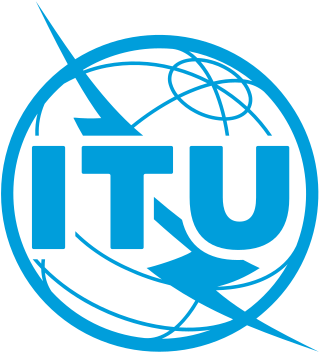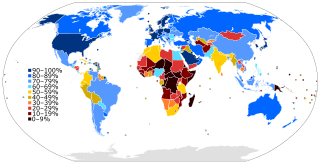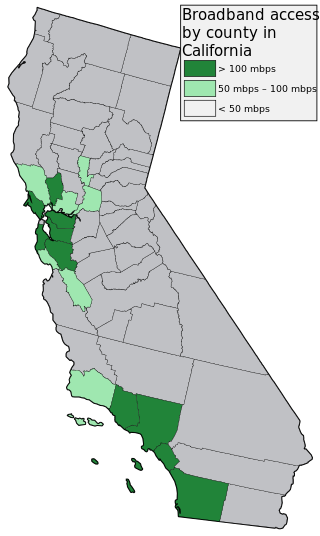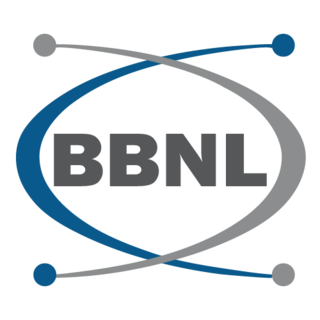Related Research Articles
Telecommunications in Guatemala include radio, television, fixed and mobile telephones, and the Internet.

The International Telecommunication Union (ITU) is a specialized agency of the United Nations responsible for many matters related to information and communication technologies. It was established on 17 May 1865 as the International Telegraph Union, significantly predating the UN and making it the oldest UN agency. Doreen Bogdan-Martin is the Secretary-General of ITU, the first woman to serve as its head.

Telecommunications in Armenia involves the availability and use of electronic devices and services, such as the telephone, television, radio or computer, for the purpose of communication. The various telecommunications systems found and used in Armenia includes radio, television, fixed and mobile telephones, and the internet.
Communications in Barbados refers to the telephony, internet, postal, radio, and television systems of Barbados. Barbados has long been an informational and communications centre in the Caribbean region. Electricity coverage throughout Barbados is good and reliable. Usage is high and provided by a service monopoly, Barbados Light & Power Company Ltd..
The digital divide is the unequal access to digital technology, including smartphones, tablets, laptops, and the internet. The digital divide creates a division and inequality around access to information and resources. In the Information Age in which information and communication technologies (ICTs) have eclipsed manufacturing technologies as the basis for world economies and social connectivity, people without access to the Internet and other ICTs are at a socio-economic disadvantage, for they are unable or less able to find and apply for jobs, shop and learn.

Internet access is a facility or service that provides connectivity for a computer, a computer network, or other network device to the Internet, and for individuals or organizations to access or use applications such as email and the World Wide Web. Internet access is offered for sale by an international hierarchy of Internet service providers (ISPs) using various networking technologies. At the retail level, many organizations, including municipal entities, also provide cost-free access to the general public.
The X band is the designation for a band of frequencies in the microwave radio region of the electromagnetic spectrum. In some cases, such as in communication engineering, the frequency range of the X band is rather indefinitely set at approximately 7.0–11.2 GHz. In radar engineering, the frequency range is specified by the Institute of Electrical and Electronics Engineers (IEEE) as 8.0–12.0 GHz. The X band is used for radar, satellite communication, and wireless computer networks.

The United Nations Information and Communication Technologies Task Force was a multi-stakeholder initiative associated with the United Nations which is "intended to lend a truly global dimension to the multitude of efforts to bridge the global digital divide, foster digital opportunity and thus firmly put ICT at the service of development for all".
The Global Earth Observation System of Systems (GEOSS) was built by the Group on Earth Observations (GEO) on the basis of a 10-Year Implementation Plan running from 2005 to 2015. GEOSS seeks to connect the producers of environmental data and decision-support tools with the end users of these products, with the aim of enhancing the relevance of Earth observations to global issues. GEOSS aims to produce a global public infrastructure that generates comprehensive, near-real-time environmental data, information and analyses for a wide range of users. The Secretariat Director of Geoss is Barbara Ryan.

Internet governance consists of a system of laws, rules, policies and practices that dictate how its board members manage and oversee the affairs of any internet related-regulatory body. This article describes how the Internet was and is currently governed, some inherent controversies, and ongoing debates regarding how and why the Internet should or should not be governed in future.

The Internet in Africa is limited by a lower penetration rate when compared to the rest of the world. Measurable parameters such as the number of ISP subscriptions, overall number of hosts, IXP-traffic, and overall available bandwidth are indicators that Africa is far behind the "digital divide". Moreover, Africa itself exhibits an inner digital divide, with most Internet activity and infrastructure concentrated in South Africa, Morocco, Egypt as well as smaller economies like Mauritius and Seychelles. In general, only 24.4% of the African population have access to the Internet, as of 2018. Only 0.4% of the African population has a fixed-broadband subscription. The majority of internet users use it through mobile broadband.

Hamadoun Ibrahim Touré of Mali was Secretary General of the International Telecommunication Union (ITU), the specialized agency of the United Nations dedicated to information and communication technologies (ICTs), from 2007 to December 2014. He was re-elected for a second four-year term in 2010. Since 2007, he has worked to fulfil ITU's mandate to 'connect the world' and help achieve the Millennium Development Goals.
Tele-epidemiology is the application of telecommunications to epidemiological research and application, including space-based and internet-based systems.

Broadband mapping in the United States are efforts to describe geographically how Internet access service from telephone and cable TV companies is available in terms of available speed and price. Mapping has been done on the national as well as the state level. The efforts are seen as preliminary steps towards broadband universal service.
The Broadband Commission for Sustainable Development was established in May 2010 as a joint initiative by the International Telecommunication Union (ITU) and the United Nations Educational, Scientific and Cultural Organization (UNESCO) to promote Internet access, in particular, broadband networks in order to help achieve United Nations development goals, such as the Millennium Development Goals. The Commission was renamed the Broadband Commission for Sustainable Development, following the adoption of the UN's Sustainable Development Goals in September 2015.

BharatNet, also known as Bharat Broadband Network Limited (BBNL), is a central public sector undertaking, set up by the Department of Telecommunications, a department under Ministry of Communications of the Government of India for the establishment, management, and operation of the National Optical Fibre Network to provide a minimum of 100 Mbit/s broadband connectivity to all 250,000-gram panchayats in the country, covering nearly 625,000 villages, by improving the middle layer of nation-wide broadband internet in India to achieve the goal of Digital India.

Christopher Fabian is a technologist who works for UNICEF. He founded technology and finance initiatives in both the public and private sector, including the creation in 2006, of UNICEF's Innovation Unit.
Kacific Broadband Satellites Group (Kacific) is a satellite operator providing a high-speed broadband internet service for the South East Asia and Pacific Islands regions. Its first Ka-band HTS satellite, Kacific1, was designed and built by Boeing and launched into geostationary orbit atop a SpaceX Falcon 9 launch vehicle on 16 December 2019.

Doreen Bogdan-Martin is an American diplomat and engineer, current Secretary-General of the International Telecommunication Union. She was elected at the 2022 ITU Plenipotentiary Conference in Bucharest, and as the first woman in the 157-year history of the ITU to become the Secretary-General. Previously, she was the first woman to become an Elected Official of the ITU, as the Director of the Telecommunication Development Bureau of the ITU.
The Partner2Connect Digital Coalition is a United Nations multi-Agency joint programme of work, between the International Telecommunication Union, United Nations Tech Envoy, and UN High Representative for LMICs to connect all of the world's population to the internet. The Coalition aims to extend the benefits of ICT access - such as rights, representation, education, and healthcare - to the global population, by as a first step connecting them to the global community.
References
- 1 2 "Project Connect: Mapping school connectivity globally" . Retrieved 7 December 2023.
- ↑ "Giga" . Retrieved 7 December 2023.
- ↑ Ferguson, Sarah. "UNICEF USA BrandVoice: UNICEF And ITU's Giga Initiative Aims To Connect The World's Schools To The Internet". Archived from the original on 16 February 2022. Retrieved 16 February 2022– via Forbes.
- ↑ "Secretary-General's remarks at the 1st General Assembly Thematic Consultation as a follow-up to the report "Our Common Agenda" – Accelerating and scaling up the Sustainable Development Goals, leaving no-one behind [as delivered] | United Nations Secretary-General". United Nations . Archived from the original on 16 February 2022. Retrieved 16 February 2022.
- ↑ "Updates – Giga". gigaconnect.org. Archived from the original on 16 February 2022. Retrieved 16 February 2022.
- ↑ https://www.lavanguardia.com/local/barcelona/20220715/8411897/barcelona-sera-sede-organismo-naciones-unidas.html In Spanish: Barcelona will be the headquarters of the UN project